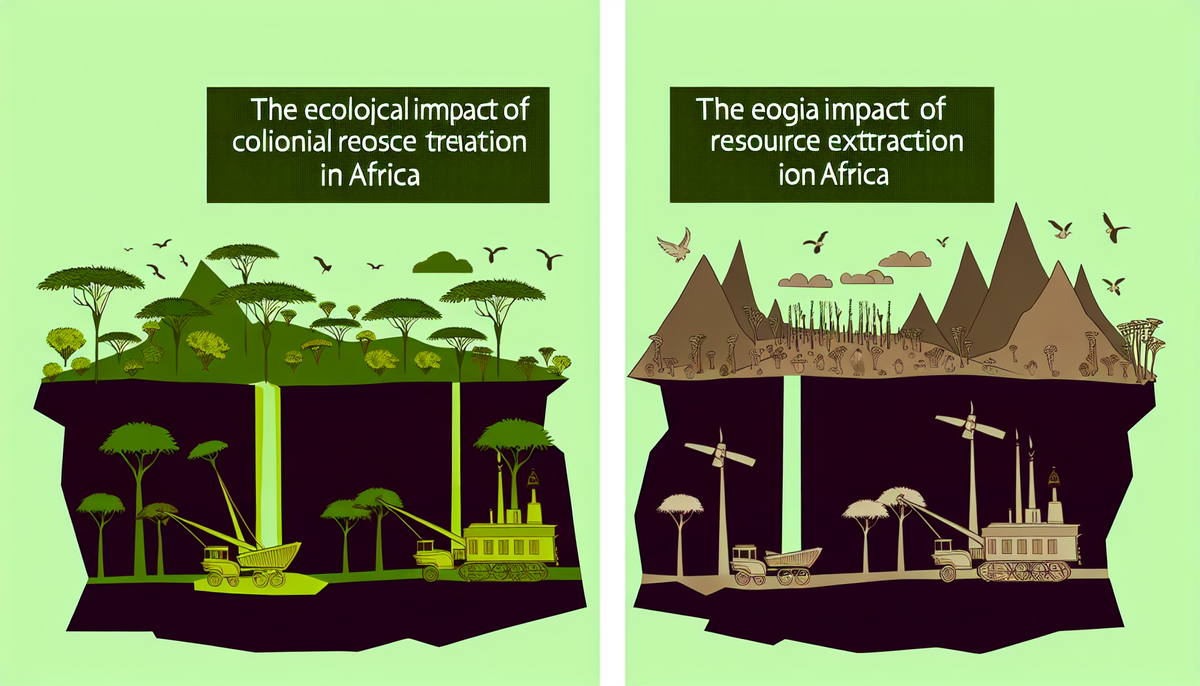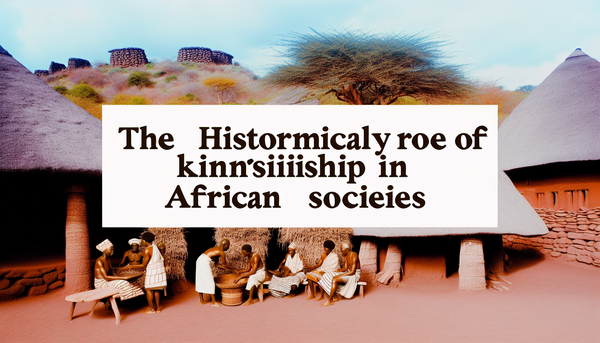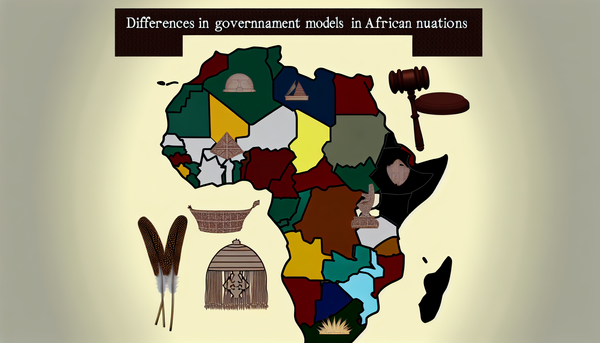The Ecological Impact of Colonial Resource Extraction in Africa

Introduction to Colonial Exploitation and Its Environmental Consequences
Colonial exploitation in Africa, driven by European powers from the late 19th century to the mid-20th century, profoundly altered the continent's ecological landscape. Colonizers sought to extract valuable resources such as minerals, timber, and agricultural products for their own economic gain, often disregarding the environmental repercussions of their activities. This exploitation not only prioritized profit over sustainability but also introduced industrial practices that had devastating effects on local ecosystems.
As vast areas were cleared for plantations and mining, biodiversity suffered immensely. Indigenous flora and fauna, adapted to their natural habitats for millennia, were decimated. Deforestation not only led to habitat loss but also disrupted local water cycles, resulting in increased soil erosion and reduced agricultural productivity. Moreover, the imposition of foreign agricultural techniques and monoculture farming undermined traditional practices that had maintained ecological balance.
The consequences of these actions have reverberated through generations, creating a legacy of environmental degradation that continues to affect present-day Africa. Understanding the historical context of colonial exploitation is crucial in addressing ongoing ecological challenges and promoting sustainable development across the continent.
Deforestation and Biodiversity Loss Due to Agricultural Expansion
The expansion of agriculture during the colonial period in Africa led to extensive deforestation, fundamentally altering the continent’s ecosystems. Colonial powers prioritized cash crops such as cotton, tea, and rubber, often reconfiguring landscapes to maximize land exploitation. Vast stretches of forests were cleared to make way for these monocultures, resulting in significant biodiversity loss as unique habitats were destroyed.
This transformation not only eradicated numerous plant and animal species but also disrupted complex ecological interactions. Forest ecosystems, which previously served as vital carbon sinks, were replaced by agricultural land that contributed to increased greenhouse gas emissions. The decline in biodiversity has had cascading effects on food security and local livelihoods, as the reduced variety of native species impacts nutrition and resilience against pests and diseases.
Indigenous communities, who relied on diverse ecosystems for their sustenance and cultural practices, found themselves marginalized. The disappearance of traditional knowledge surrounding sustainable agriculture further exacerbated the situation, as local populations struggled to adapt to the rapidly changing environment. Today, the consequences of this colonial agricultural expansion are still felt, with deforestation continuing to drive ecological challenges in contemporary Africa. Addressing these historical injustices is essential for fostering a more sustainable future.
Mining Operations and Their Impact on Soil and Water Quality
The mining operations initiated during the colonial era in Africa have had profound and lasting impacts on soil and water quality across the continent. These activities, aimed at extracting valuable minerals such as gold, diamonds, and copper, often took place with little regard for environmental stewardship. Heavy machinery and explosives not only scarred the land but also led to significant soil erosion and contamination.
The removal of topsoil during mining disrupts natural habitats and diminishes soil fertility, making it difficult for local vegetation to thrive. Moreover, toxic by-products from mining processes, including heavy metals and chemicals, frequently leach into the surrounding environment, polluting waterways. This contamination poses serious risks to both aquatic ecosystems and human health, as polluted water sources can lead to illness and unsafe drinking conditions.
Furthermore, the alteration of landscapes increases vulnerability to climate change effects, such as flooding and drought, further undermining local agricultural practices. Communities that depend on clean water and fertile soil for their livelihoods face increased challenges due to these ecological impacts. As Africa continues to grapple with these industrial legacies, efforts to restore and rehabilitate affected areas are crucial for protecting both the environment and local populations.
The Role of European Powers in Shaping Africa’s Environmental Degradation
European powers played a pivotal role in shaping Africa's environmental degradation during the colonial era. Their relentless pursuit of economic gain led to systematic exploitation of resources, as countries sought to maximize profits through the extraction of natural wealth. This imperialistic approach often marginalized local populations and dismissed their traditional practices, which had historically maintained ecological balances.
Colonial administrators frequently implemented policies that encouraged deforestation and unsustainable agricultural practices. Land that had been home to diverse ecosystems was cleared for European cash crops, drastically altering landscapes and disrupting local wildlife. The emphasis on monocultures not only reduced biodiversity but also made ecosystems more susceptible to diseases and pests, requiring increased chemical interventions.
Additionally, the introduction of large-scale mining operations led to soil degradation and water contamination, with devastating effects on both local communities and the environment. European powers established infrastructure that prioritized resource extraction over ecological health, leaving a legacy of pollution and landscape alteration.
As these nations expanded their empires, the environmental repercussions were profound and multi-faceted, laying the groundwork for ongoing ecological challenges in modern Africa. Understanding this historical context is essential for addressing ancestral grievances and promoting sustainable resource management practices today.
Loss of Indigenous Knowledge and Practices in Natural Resource Management
The colonial era in Africa led to a significant loss of indigenous knowledge and practices in natural resource management, undermining centuries of local wisdom that had sustainably governed ecosystems. Indigenous communities held valuable insights into the intricate relationships between flora, fauna, and their environments, developed through generations of close interaction with nature. However, colonial powers frequently dismissed these traditional practices, enforcing foreign systems of governance that prioritized extraction over conservation.
The imposition of European agricultural techniques and land use disregarded the sustainable methods that indigenous peoples had adapted to their specific ecological contexts. Practices such as rotational grazing, polyculture farming, and sacred land management were sidelined, leading to less resilient agricultural systems and reduced biodiversity. In many cases, the native custodians of this knowledge were marginalized or forcibly relocated, severing their connection to the land.
This loss has not only diminished biodiversity but has also weakened community ties and cultural identities. The erosion of traditional ecological knowledge has made it difficult for contemporary communities to engage in effective environmental stewardship. Efforts to revitalize and integrate indigenous knowledge into current resource management strategies are essential for promoting sustainable practices, fostering resilience, and addressing ongoing ecological challenges in Africa.
Conservation Efforts Post-Independence and Challenges Faced
Following independence, many African nations recognized the urgent need to address the environmental degradation inherited from colonial rule. Conservation efforts emerged as a priority, aiming to restore ecosystems and protect biodiversity while promoting sustainable development. Governments established national parks and wildlife reserves, implementing policies intended to safeguard natural resources and wildlife populations. International partnerships and funding from organizations like the World Wildlife Fund and UNESCO also played a crucial role in these initiatives.
However, these conservation efforts faced numerous challenges. Political instability, economic constraints, and insufficient infrastructure hindered effective implementation. Many countries struggled to balance the demands of economic development with environmental preservation, often prioritizing short-term gains over long-term sustainability. Furthermore, conflicts over land use between conservation areas and local communities created tensions, as indigenous populations often relied on these lands for their livelihoods.
Additionally, conservation efforts occasionally followed a top-down approach, disregarding the importance of local knowledge and community involvement in resource management. This exclusion often led to resistance from communities who felt marginalized from decision-making processes regarding their land. To foster successful conservation strategies, it is imperative that future initiatives incorporate local communities’ perspectives and knowledge, promoting collaboration for sustainable environmental stewardship.
Long-Term Effects on Climate and Local Communities
The historical exploitation of Africa's natural resources has led to significant long-term effects on both climate and local communities. Deforestation, driven largely by agricultural expansion and mining activities, has resulted in the loss of vital carbon sinks, exacerbating climate change. As forests disappear, the capacity of ecosystems to absorb carbon dioxide diminishes, leading to increased greenhouse gas concentrations in the atmosphere. These changes contribute to unpredictable weather patterns, extreme temperatures, and more frequent droughts, directly impacting agricultural productivity and food security.
Local communities, often dependent on natural resources for their livelihoods, face heightened challenges due to these climatic shifts. Declining agricultural yields and water shortages threaten the subsistence farming practices that many families rely on, leading to food scarcity and increased poverty. Moreover, the degradation of ecosystems undermines biodiversity, further destabilizing local economies that rely on diverse resources.
In addition, the social fabric of communities is strained as competition for diminishing resources intensifies, heightening conflicts over land and water access. The loss of traditional knowledge and practices, compounded by climate disruptions, leaves these communities inadequately equipped to adapt to new environmental realities. Addressing these long-term effects requires comprehensive strategies that prioritize sustainability and empower local voices in climate action and natural resource management.



